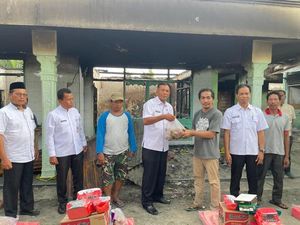On May 6, 2025, Congress President Mallikarjun Kharge addressed a rally in Ranchi, Jharkhand, claiming that Prime Minister Narendra Modi had received an intelligence report regarding a potential terrorist attack in Jammu and Kashmir. This report was allegedly the reason for Modi's decision to cancel his scheduled visit to the region. Kharge stated that the report was sent to the Prime Minister three days prior to the terrorist attack that occurred in Pahalgam on April 22, 2025, labeling it an "intelligence failure" and questioning why the government did not take preventive measures. "If the government was aware of the threat, why did they not act? I learned that the report was sent to PM Modi three days before the attack, and that is when he canceled his Kashmir tour. I read this in the newspaper too," Kharge emphasized.
In the wake of escalating tensions between India and Pakistan, 75-year-old retired Captain Amarjeet Kumar has expressed his willingness to serve the country again. Kumar, who fought in the 1971 war, has reached out to Army Chief General Upendra Dwivedi, indicating his desire to rejoin the military as a volunteer following the recent terrorist attack in Pahalgam. "A soldier cannot be separated from war," he remarked, highlighting the urgency felt by many citizens amidst the deteriorating security situation.
As the situation remains tense, the Indian government is taking proactive measures. The Home Ministry has ordered civil defense mock drills to be conducted across several states on May 7, 2025. This decision follows the Pahalgam attack and aims to prepare citizens for emergencies such as war or missile attacks. In a related development, a significant meeting led by the central Home Secretary was held at 10:45 AM on the same day, involving chief secretaries and civil defense heads from across the country to discuss the execution of these drills.
In Jharkhand, the weather is expected to change, with a yellow alert issued for 20 districts, prompting officials to warn residents to remain cautious. The mock drill in Jharkhand will take place at six locations in five districts, including Ranchi, focusing on emergency preparedness.
India's relations with Pakistan have become increasingly strained following the Pahalgam attack, which has sparked fears of potential military conflict. Reports indicate that Pakistan has repeatedly violated ceasefire agreements in the region, with artillery fire directed at several Indian border areas. The Indian Army has responded with measured force, emphasizing the need for restraint.
In response to the growing tensions, Prime Minister Modi has stated, "India's rightful water will now flow within our borders and serve our people." This statement reflects a broader sentiment of national pride and self-sufficiency amidst the ongoing geopolitical challenges.
On the international front, Qatar's Amir Sheikh Tamim bin Hamad Al-Thani reached out to Modi, expressing condolences for the victims of the Pahalgam attack and reiterating Qatar's support for India's fight against terrorism. This gesture underscores the importance of international solidarity in combating extremist violence.
As the government mobilizes resources for the civil defense mock drills, the public is being educated on emergency protocols, including the use of air raid sirens and evacuation procedures. This initiative is part of a broader strategy to enhance national preparedness in the face of potential threats.
In Delhi, the civil defense mock drill is set to take place at 4 PM, followed by a blackout exercise at 7 PM. Residents are advised to participate actively to familiarize themselves with safety measures. The Delhi government has convened a high-level meeting to ensure that the drill is executed effectively, with the involvement of various departments and agencies.
As the political atmosphere intensifies, the Congress party is also addressing domestic issues, with Kharge calling for a caste census and pushing for reforms in reservation policies. This push comes amid criticism of the government’s handling of security and social issues.
In summary, the situation in Jammu and Kashmir remains precarious, with the government responding to both internal and external pressures. The combination of military readiness, civil defense preparation, and political maneuvering illustrates the complex landscape of security and governance in India today.




